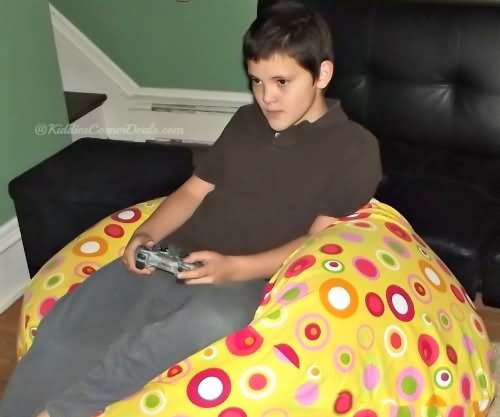 Loading... Please wait...
Loading... Please wait...- Home
- AHH Bean Bag Chair Blog
- How Video Games Affect Our Kids
Shop Now
How Video Games Affect Our Kids
Posted April 10, 2013
Thank you to Mick for this awesome article!
Video games have been around for decades now, and they come in all shapes and sizes. Unlike TV and Movies, video games allow the player to become an active part of the experience. So, the effects they have on players, children especially, is that much more pronounced.
“Video games change your brain,” says University of Wisconsin psychologist C. Shawn Green.
Just like playing the piano, reading maps, or any other cognitive activity, video games modify brain development. In childhood, our brains are in a highly receptive, formative mode. We develop the thought patterns and behaviors that allow us to function in our daily lives, and video games can become a huge part of that. Let's explore some Cons and Pros.

Cons
Let’s get the bad news out of the way. The unfortunate truth is that many video games are violent. Unlike other media, the player has to enact the violence, often repeatedly, in order to advance.
According to a study published by Bushman & Anderson, after a limited amount of play time, a player can "automatically prime aggressive thoughts" (Bushman & Anderson, 2002, p. 1680). It was concluded that those with prior experience playing violent games responded with an “increased level of aggression” when they encountered confrontation in real life. (Bushman & Anderson, 2002.)
If people’s brains are in “sponge mode” during childhood, it’s really no wonder that actively participating in the violent problem-solving that's prevalent in many video games forms strong thought patterns.
Extensive video gaming can also result in poor attention span, due to the “instant gratification” aspects of many video games. Stunting development of a child’s propensity for “delayed gratification” negatively impacts their EQ (or Emotional Quotient). Read this article for more information on the meaning and importance of a child’s EQ.

Pros
Yes, thank goodness there are Pros, because it's nearly impossible to keep our kids away from this form of entertainment! Video games aren’t all bad of course. Just like the Children’s Television Workshop took the brainwashing power of television and wielded it for good in creating educational programming like Sesame Street, many video games may have the positive ability of developing a child’s mind in positive ways.
Problem solving skills are critical to any decent video gamer. Games like the Legend of Zelda series are filled with action as well as puzzles in the various dungeons that require players to think in new and sometimes abstract ways. Most games in the role-playing genre, like Castlevania or Megaman: Battle Network, require several different types of problem solving at various levels of difficulty.

Believe it or not, certain games can even help develop multi-tasking skills as well. If you have ever felt like you are talking to the wall when your child is playing... Your child may not hear you try to talk to them while they’re playing their video game because they’re fighting six enemies, protecting their base, and keeping their friends alive (all while keeping themselves from being captured or worse). Games such as Ultimate Spiderman and Kingdom Hearts often require players to be actively aware of multiple variables in order to succeed.
In the gaming world, a quick decision can be life or death or capture for the player or another character. In some role-playing games like the Fable series, the wrong decision won’t always end in a “Game Over,” but will instead have disastrous consequences in the game’s story. In a study lead by cognitive scientist Daphne Bavelier, it was shown that video games that simulate stressful events, such as those in battle or action games, can be a helpful training tool for real-world situations. Video games can uniquely emulate stressful situations that require quick assessments and decisions, exercising parts of the mind that would otherwise only be used in real crises.
Common sense tells us that too much of anything can be usually be bad for us and our kids. That certainly holds true for gaming. But if allow your child to indulge in video games every so often, and he doesn't become obsessed, you don't have to worry that his brain is being turned to mush. However, as always with all things that have to do with children, parents must be mindful and pay attention to any signals (such as aggression) that are unhealthy. Kids should never eat, drink, and breathe gaming. Books and playing outside should always be thrown in the mix!
What are your experiences and your children's experiences in gaming? Please share!
Yours truly, Jade
.











